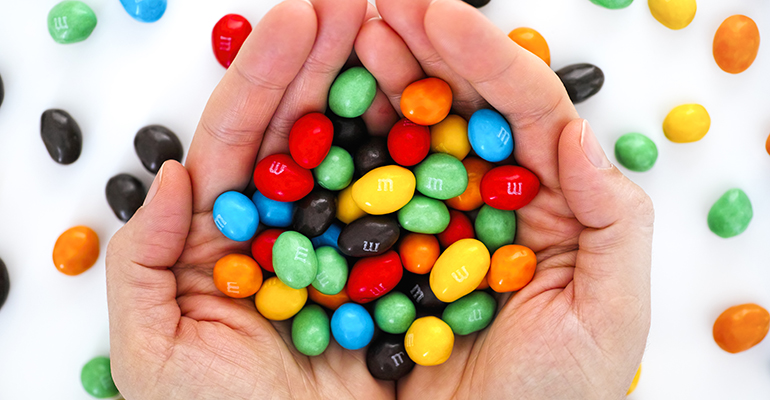News
Mars abandons US pledge to remove artificial colours
20 Feb 2021Mars has abandoned its 2016 pledge to remove artificial colours, associated with behavioural problems in children, from its US portfolio.
In 2016, confectionery and packaged food giant Mars announced plans to remove synthetic food colourings from its US portfolio of products, including M&Ms and Skittles.

The colours Red 40, Yellow 5, and others have been associated with behavioural problems in children. Brands that choose to use them in Europe, for instance, must add a warning to the product packaging that they may have an adverse effect on activity and attention in children.
However, Mars has rolled back on its promise to US consumers. A statement on its global website reads: “[The 2016 announcement] was based on our belief, at the time, that a critical mass of our consumer base was seeking more natural ingredients and would welcome this change.
“Since that time, a cross-functional Mars team has dedicated significant time and investment to develop new ingredients, secure regulatory approvals, address manufacturing readiness, and, importantly, dive more deeply into the needs and expectations of our consumers.
“In doing so, we have found that consumer expectations regarding colours in food differ widely across markets and categories. This has motivated us to re-evaluate our global intent and seek to identify approaches that are more locally tailored to address these differences.”
The company said it would continue to prioritize its efforts to remove artificial colours in Europe “where consumers have expressed this preference”, but that it would not be removing all artificial colours from the Mars Wrigley portfolio in other markets.
CSPI: ‘A convenient excuse’
Non-profit consumer watchdog organisation, the Center for Science in the Public Interest (CSPI), slammed the manufacturer for congratulating itself on removing the chemicals from its European products while leaving them in products destined for other markets, and called the decision to retain artificial colours in US products “a shocking reversal”.
Senior scientist at CSPI Lisa Lefferts said: “Mars never came through on its promise to American parents and should be held accountable for continuing to expose children’s developing brains to these problematic dyes. The company is hiding behind a convenient excuse when it tells American consumers that European consumers care more about dyes than we do. Rather, we believe Mars was far more motivated to remove dyes from its products marketed in Europe than the US by stricter regulations in Europe that require warning labels for most dyed foods.”
Making the change
Artificial colours are widely used in US products. In 2014, researchers collected over 800 products from one grocery store in North Carolina and found that over 43% contained artificial food colours. The most common artificial food colours used were Red 40 (accounting for 29.8% of products), followed by Blue 1 (24.2%), Yellow 5 (20.5%), and Yellow 6 (19.5%), while candies (96.3%), fruit-flavoured snacks (94%), and drink mixes and powders (89.7%) were the most prevalent categories.
This prevalence means that consumers, particularly children, have become accustomed to vibrant colours.
Healthy snack company KIND launched Fruit Bites, a snack made from 100% fruit and free from added sugar, concentrates, colours or preservatives, in 2017. Two years later, it removed the products from supermarket shelves, citing a “retail failure”.
“[We are] concerned that American kids are now accustomed to eating foods that are artificially colourful and less likely to try and enjoy foods that are naturally coloured,” it said in a statement.
In recent years, food suppliers have developed natural food colourings that are able to match artificial dyes for vibrancy and functionality although they tend to be more expensive than artificial additives.
